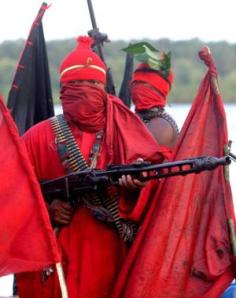 The battle for oil control in Nigeria looks set to escalate according to a report in Saturday’s Washington Post. Government troops launched an attack on militant strong holds to weaken them, but the militants are threatening large scale revenge attacks on the oil infrastructure and warned foreign contractors in the region to leave within 24hours.
The battle for oil control in Nigeria looks set to escalate according to a report in Saturday’s Washington Post. Government troops launched an attack on militant strong holds to weaken them, but the militants are threatening large scale revenge attacks on the oil infrastructure and warned foreign contractors in the region to leave within 24hours.
The Movement for the Emancipation of the Niger Delta told The Associated Press in a statement that the Nigerian army and navy raided their positions on Rivers State, pouring in ground troops from landing craft and bombing their fighters from jets and helicopters. They said seven militants were killed.
The militants already hold hostages two Britons, two South Africans and a Ukrainian, plus twenty-two Nigerians.
The militants are behind nearly three years of rising violence in the southern Niger Delta. They say their deeply impoverished areas have not benefited from five decades of oil production and they are agitating for more federally held oil funds to be sent to the southern oil states.
The government acknowledges the grievances of many in the southern Niger Delta, but denounces the militants as criminals who use their struggle as a cover to make money by stealing crude oil and selling it overseas.
Corrupt government officials, however, also siphon off and sell oil and many state-level politicians are linked to the militants and other armed gangs, whom they hire to rig elections.
COMMENT
I reported on the Nigerian oil based corruption problem in an earlier post The Curse of Black Gold. Corruption within the Nigerian government is well documented and so is the theft of oil by militants, which also seems to do little to benefit the poor. This is not a case of good fighting evil, it is a case of evil fighting evil for corrupt control of oil. Foreign oil companies interests are threatened, but they seem to keep remarkably quiet about the escalating situation, and where oil is concerned their role in this situation is also unlikely to be clean.
PHOTO CREDIT
Militants from the Movement for the Emancipation of the Niger Delta (MEND) patrol the creeks of Bonny river near the LNG plant in the oil rich Niger delta region of Southern Nigeria from Curse of The Black Gold: 50 Years of Oil in the Niger Delta with photographs by Ed Kashi
